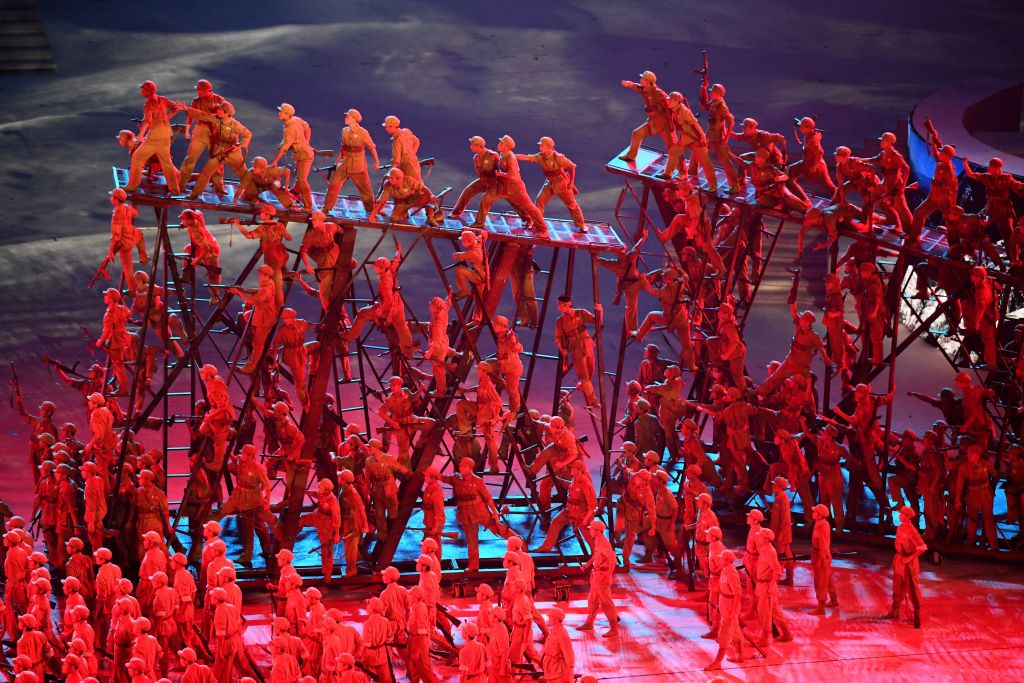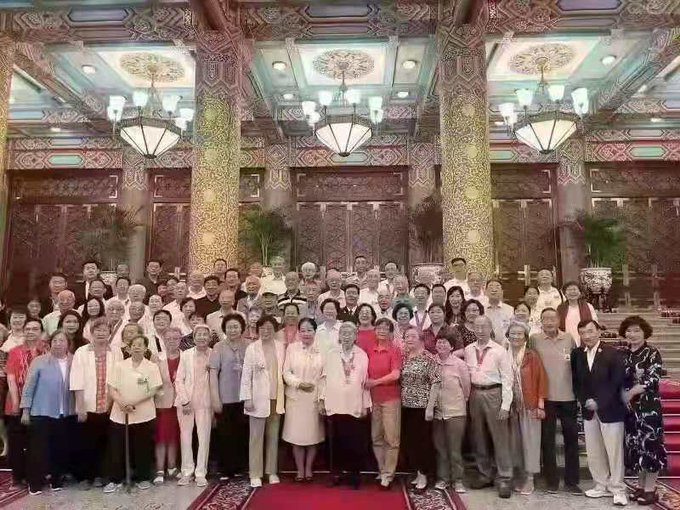The Chinese Communist Party and the people
Posted By John Fitzgerald on July 6, 2021 @ 14:30

Enough has been said and left unsaid about the history of the Chinese Communist Party on the centenary of its founding to last us all a while. As the doyen of official party historians, Jin Chongji, once explained to his students, good party historians need to tell the truth, but they need not tell all of it. Official party history is crafted on the assumption that partial truths need to be told at very great length.
While the party can hide from its history, it cannot escape its sociology. General Secretary Xi Jinping heads an exclusive elite of powerful Red-Successor families who flaunt their status and privilege. Their group photo was placed on display on 1 July.

Source: Gao Yu [1]/Twitter.
The CCP was formally established as a Leninist vanguard party in Shanghai in July 1921 with a founding vision of achieving national wealth and power by overthrowing the political power of property-owning classes, doing away with private property altogether, building a socialist economy, installing a dictatorship of the proletariat, and promoting world revolution to overthrow liberal capitalism. It has been aiming to achieve those goals on and off ever since.
For a time in the Reform era (1979–2009), the party leadership recognised the inconsistency between the socialist and nationalist goals of that original vision and focused on growing the economy, rebuilding the state, and restoring the party’s standing in the eyes of China’s people and the world. On most measures it succeeded.
In November 2012, Xi took over and promised, in what was to become a signature phrase, ‘not to forget the original vision’ (buwang chuxin). Since then, he has harnessed the resources of a great and powerful country to realise all of the party’s original goals—with the notable exception of world revolution. Exporting Leninist rule or communist ideology to other countries would surrender the party’s authoritarian advantage. China’s trade, investment, security and foreign-influence strategies are parasitical on the conventions of openness, rule of law and reciprocity that are hard-wired into the liberal democratic model. The last thing the government of China can afford is for other countries to model their systems or behaviour on its own.
The reforms introduced in the intervening period were not anomalous. They extended from economic reform to reform of the legal system, civil society, education and media, all essential for achieving the prodigious growth of the Reform era. Nor were they part of an elaborate front, disguising the true intentions of a devious party cabal. There’s no denying that dissimulation is part of the ‘red gene’—the party’s term for its core identity—but China’s reformers weren’t trying to deceive anyone. They were defeated by a party leadership that reverted to Leninist type following the exogenous shock of the global financial crisis.
It is not the party’s Marxist convictions but its changing social composition that explains this reversion. In the lead-up to the centenary celebrations, Xi and his leadership team exercised obsessive control over every utterance on party history, but they were relatively free and easy with their graphics and demographics, allowing grassroots sociologists to have a field day.
Many of the top hundred or so dignitaries given pride of place in chauffeuring and seating arrangements at the grand parade in Tiananmen Square on 1 July were descendants of the highest party, military and government leaders of the civil war period and the People’s Republic’s early years—more than half of them powerful and wealthy ‘Red Second Generation’ (hong erdai) figures in their own right. In the popular imagination, China is owned and run by these privileged successors of the early revolutionary era who have no intention of surrendering their grip on power or privilege through system reform. They make up one big ‘party clan’ (xingdang), to quote another of Xi’s favourite expressions.
In placing his party clan on display, Xi exposed two structural defects in China’s social and political hierarchies. First, nepotism is endorsed at the top of the party, but it’s frowned upon at middle-management and lower levels because it corrodes the leadership’s lines of command over the massive cadre system. A 1994 manual for cadre management devoted two chapters to managing distaff and family relations to prevent their influencing decisions and employment in mid-level staff offices.
And yet nepotism at the top is regarded as essential for party survival. In the early 1980s, Vice-Chairman Chen Yun led efforts to recruit a new generation of cadre-successors to replace those dismissed during the Cultural Revolution. He came to the view that true successors in leadership positions should be selected from among leading cadre families. Failure to keep control over cadre appointments within the families that built and ran the People’s Republic, he reasoned, would spell the end of power and privilege for the lot of them—or, as he put it, ‘If we don’t allow our offspring to take over from us, we’ll be digging our own graves.’
Here’s the thing. The kind of nepotism essential for the leadership’s survival is anathema to the Leninist cadre system through which it runs the country. There has been a long-running stand-off since Xi took charge between mid-level cadres sitting on their hands and a leadership urging them to stand up and get cracking. Millions of cadres grumble that what’s good for the goose ought to be good for the gander.
The second problem with the party’s social formation is the structural separation of the cadre vanguard from the common people of China—or ‘insiders’ from ‘outsiders’, as they are called in China. Mid-level cadres look with envy on the privileges their top leaders enjoy and yet cling to the privileges that distinguish themselves from commoners, ranging from access to better medical and hospital care, to prized urban registration, to clean and fresh produce delivered through segregated supply lines, to benefits around subsidised housing and vehicles and children’s education, and to privileges reserved for their retirement.
These material privileges derive from a more substantial one: cadres and party members are the only people in China entitled to participate in public life and politics. The political realm is off limits to ordinary people. In a public essay published in 2018, Tsinghua University professor Xu Zhangrun noted that ordinary people look on cadres’ special rights and privileges ‘with mute and heartfelt bitterness’. He was jailed for saying it.
Karl Marx featured prominently in the party’s centenary celebrations but, consistent with party history writing, only partially. Some of his more pertinent observations were overlooked. When the nephew of Napoleon Bonaparte, Louis Bonaparte, was proclaimed emperor 30 years after his uncle’s passing, Marx remarked that the elevation of the next generation of Bonapartes would expose the cult of the original Napoleon to public scrutiny, and mark the beginning of the end of the Napoleonic family legend. That turned out to be one of his more accurate predictions.
This post is excerpted from the author’s forthcoming book, Cadre nation, to be published by UNSW Press in 2022.
Article printed from The Strategist: https://www.aspistrategist.org.au
URL to article: https://www.aspistrategist.org.au/the-chinese-communist-party-and-the-people/
URLs in this post:
[1] Gao Yu: https://twitter.com/gaoyu200812/status/1411519182772965377
Click here to print.